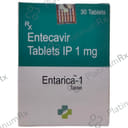Entecavir
Uses
Entecavir is used in the treatment of chronic hepatitis B virus (HBV) infection.
How it Works
How Entecavir works: Entecavir is an antiviral medication that inhibits the replication of the virus in human cells. This action prevents the virus from producing new viral particles and helps to resolve the infection.
Side Effects
Common side effects of Entecavir include increased alanine aminotransferase levels.
Expert Advice
- You have been prescribed Entecavir for the treatment of chronic hepatitis B virus (HBV) infection.
- Take it on an empty stomach, at least 2 hours after or before a meal.
- Entecavir may cause dizziness or sleepiness.
- Do not drive or engage in activities requiring concentration until you know how it affects you.
- You may still develop infections or other illnesses associated with viral infections while taking this medication.
- You can also transmit HIV or HBV to others.
- Do not share needles or personal items that may have blood or body fluids on them.
- During treatment and for at least six months after stopping this medicine, regular blood tests are required to monitor:
- Liver function
- Level of hepatitis B virus
- Blood cell counts
Related Medications
Entecavir 0.5mg

₹451
MRP ₹902.1
Entecavir 0.5mg

₹786

₹451
MRP ₹902.1
Entecavir 0.5mg

₹2,275

₹451
MRP ₹902.1
Entecavir 1mg

₹3,550

₹683.5
MRP ₹1,367
Entecavir 1mg

₹1,470

₹683.5
MRP ₹1,367
Entecavir 1mg

₹2,331.4

₹683.5
MRP ₹1,367
Entecavir 1mg

₹1,225

₹683.5
MRP ₹1,367
Entecavir 1mg

₹1,184.3

₹683.5
MRP ₹1,367
Entecavir 1mg

₹1,219.6

₹683.5
MRP ₹1,367
Entecavir 0.5mg

₹2,097

₹451
MRP ₹902.1
Entecavir 0.5mg

₹790.8

₹451
MRP ₹902.1
Entecavir 0.5mg

₹745.5

₹451
MRP ₹902.1
Entecavir 0.5mg

₹2,187

₹451
MRP ₹902.1
Entecavir 0.5mg

₹2,150

₹451
MRP ₹902.1
Entecavir 0.5mg

₹2,465.1

₹451
MRP ₹902.1
Entecavir 0.5mg

₹750

₹451
MRP ₹902.1
Entecavir 0.5mg

₹2,659.5

₹451
MRP ₹902.1
Entecavir 0.5mg

₹2,659.5

₹451
MRP ₹902.1
Entecavir 0.5mg

₹777.7

₹451
MRP ₹902.1
Entecavir 0.5mg

₹720

₹451
MRP ₹902.1
Entecavir 0.5mg

₹799

₹451
MRP ₹902.1
Entecavir 0.5mg

₹744

₹451
MRP ₹902.1
Entecavir 0.5mg

₹529.7

₹451
MRP ₹902.1
Entecavir 0.5mg

₹2,705.7

₹451
MRP ₹902.1
Entecavir 0.5mg
₹790

₹451
MRP ₹902.1
Flat ₹100 off on first app order | Use Code: APP100 |
Flat ₹100 off on first app order
USE CODE: APP100

Download Now